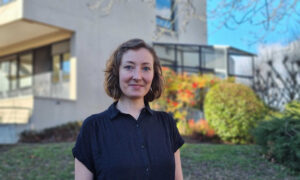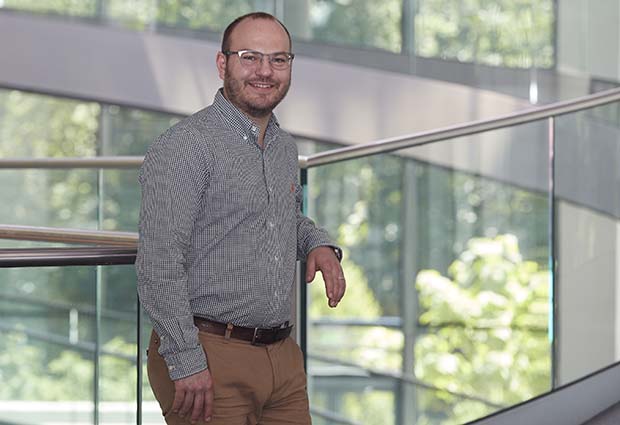
Read the latest Issue
New EMBL group leader will explore the fascinating world of the gut microbiome

Michael Zimmermann will join EMBL in August. He will set up a new research group in Heidelberg to investigate how our gut microbes influence our health, and in particular how they affect the body’s response to drugs.
I’m interested in the metabolic interactions between our gut bacteria and ourselves, the hosts. That’s the overarching topic. Recently, I’ve been focusing mainly on drug metabolism: how do the bacteria in the gut contribute to drug metabolism, and do they potentially have a role in our response to drugs? This can differ significantly from person to person. Some patients have a beneficial response, others have none, and some experience toxic side-effects. Typically, we assign this variation to host metabolism (for example, liver enzymes), but there’s so much we don’t yet know about the role of microbes. Now, with new technologies and renewed interest in the microbiome, bacteria are very much in the spotlight.
I was always interested in science. I grew up in a very small village in Switzerland and I spent a lot of time in nature. I was fascinated by the environment, and I think that triggered my interest in biology initially. I got into microbes and the microbiome during my master’s work on bacteria. I continued this during my PhD, but focusing more on pathogens and analytical technologies to measure metabolites – known as metabolomics. For my postdoc I wanted to understand a bit more about what commensal microbes in our gut do, so I ended up in the microbiome field.
Absolutely. That’s the nature of science now. We’ve stopped thinking in boxes – that you’re a microbiologist or a biochemist and you do microbiology or biochemistry for the rest of your life. That’s not really the case any more. Now researchers try to solve problems by bringing lots of different skillsets together. I believe EMBL is a great place to do that, because that way of thinking has been around for a long time here.
I like the idea of working on something that can have an impact on how we think about health, how we think about drugs, and how we think about food.
Very excited; a little bit nervous! But I think that’s a healthy mixture. There’s a whole range of tasks that are new during this transition phase, and the unknown is always a little bit daunting. But as a scientist I’m always keen to explore the unknown. There’s also something to be said about the environment here at EMBL. I attended the faculty retreat of the Structural and Computational Biology Unit a few weeks ago and it was a great experience. The transition is eased by having supportive future colleagues around.
I’m looking for people who are curious and excited about science. They should be open to new ideas and to exploring wherever science brings us, and they must be collegial – otherwise collaboration won’t work. Science in general has become much more interdisciplinary. My research is also fairly interdisciplinary, involving biochemistry and microbiology as well as technical approaches such as mass spectrometry and sequencing.
Curiosity is really central. I hope there will be an atmosphere in which people are driven by curiosity and by collaboration within the group. Science gets more and more complex and it’s important that people join forces to tackle more complicated and challenging problems. As a group leader my philosophy is to give people support while also leaving them enough freedom to be creative and follow their own ideas. I think that’s a fine balance.
Be curious. Don’t be pushed into a box. Have the courage and objectivity to stop projects if necessary, rethink, and start something else – I think that’s actually a very important trait. As a scientist it’s important to be able to take a step back and reflect not only on the problem you’re trying to solve, but also on why you’re trying to solve that problem, and on the broader context.
At the moment, with the transition to Heidelberg and setting up my group, there’s more work and less balance, but I do try! A friend who’s into music encouraged me to take up the recorder, and I started taking lessons. I like the simplicity of it. If I’m running long experiments in the lab late at night and there’s no one else around, I play a few tunes to pass the waiting time.
Looking for past print editions of EMBLetc.? Browse our archive, going back 20 years.
EMBLetc. archive